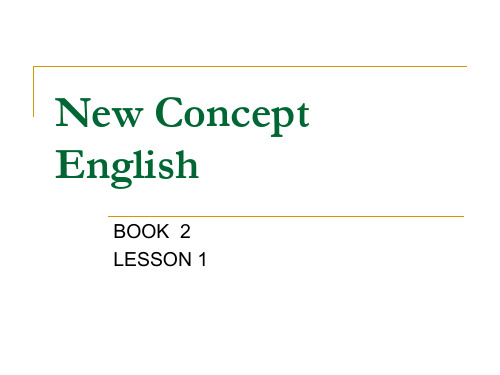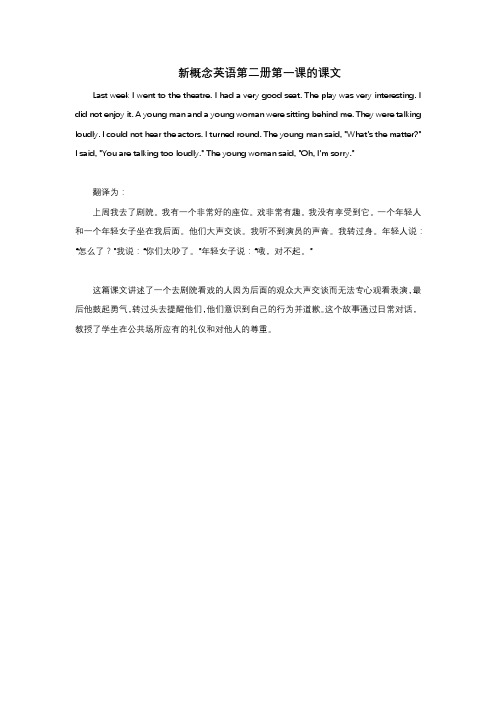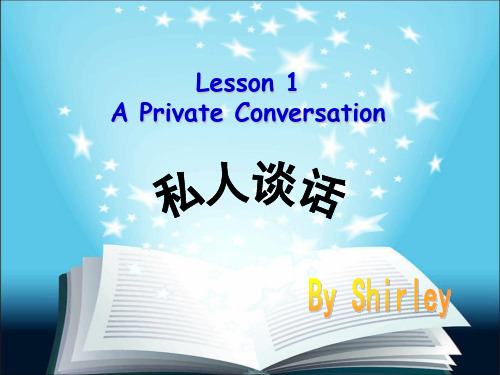新概念英语第二册第一课
新概念英语2第一课

attention n. 注意
Attention ,please. 请注意(口语) pay attention 注意 pay attention to … 对……注意 You must pay attention to that girl.
pay a little attention 稍加注意 pay much attention 多加注意 pay more attention 更多注意 pay no attention 不用注意 pay close attention 特别注意
theatre n.剧场, 戏剧
(1) 去看戏:go to the theatre (2) cinema n.电影院 seat n.座位 take a seat/take your seat 坐下来 sit down 坐下;be seated=take a seat 就坐
Sit ห้องสมุดไป่ตู้ seat作为动词的区别
angry adj. 生气的 副词形式:angrily adv. 生气地 be angry with sb./at/about sth be cross with sb. /about sth
生气的程度
程 I was annoyed. 度 I was angry/cross. 加 I was very angry. 深 be blue in the face : I am blue in the face.(脸色都青了, 相当生气了)
11. The writer could not bear it . He could not ___ it. a. carry b. suffer c. stand d. lift 12. The young man spoke rudely. He wasn‟t very ___. a. clever b. rude c. polite d. kind
概二第一课原文

新概念英语第二册第一课的课文
Last week I went to the theatre. I had a very good seat. The play was very interesting. I did not enjoy it. A young man and a young woman were sitting behind me. They were talking loudly. I could not hear the actors. I turned round. The young man said, "What's the matter?"
I said, "You are talking too loudly." The young woman said, "Oh, I'm sorry."
翻译为:
上周我去了剧院。
我有一个非常好的座位。
戏非常有趣。
我没有享受到它。
一个年轻人和一个年轻女子坐在我后面。
他们大声交谈。
我听不到演员的声音。
我转过身。
年轻人说:“怎么了?”我说:“你们太吵了。
”年轻女子说:“哦,对不起。
”
这篇课文讲述了一个去剧院看戏的人因为后面的观众大声交谈而无法专心观看表演,最后他鼓起勇气,转过头去提醒他们,他们意识到自己的行为并道歉。
这个故事通过日常对话,教授了学生在公共场所应有的礼仪和对他人的尊重。
新概念二-新概念英语第二册第1课-A private conversation

新概念英语第二册第1课:A private conversation 新概念英语第二册第1课:A private conversationLesson 1 A private conversation私人谈话First listen and then answer the question.听录音,然后回答以下问题。
Why did the writer complain to the people behind him?Last week I went to the theatre. I had a very good seat. The play was very interesting.上星期我去看戏。
我的座位很好,戏很有意思I did not enjoy it. A young man and a young woman were sitting behind me.但我却无法欣赏。
一青年男子与一青年女子坐在我的身后They were talking loudly. I got very angry. I could not hear the actors. I turned round.大声地说着话。
我非常生气,因为我听不见演员在说什么。
我回过头去I looked at the man and the woman angrily. They did not pay any attention.怒视着那一男一女,他们却毫不理会。
In the end, I could not bear it. I turned round again. ‘I can't hear a word!’ I said angrily.最后,我忍不住了,又一次回过头去,生气地说:“我一个字也听不见了!”‘It's none of your business, ’ the young man said rudely. ‘This is a private conversation!’“不关你的事,”那男的毫不客气地说,“这是私人间的谈话!”New words and expressions 生词和短语private(title)adj. 私人的angry新概念英语第二册第1课:A private conversation adj. 生气的conversationn. 谈话angrilyadv. 生气地theatren. 剧场,戏院attentionn. 注意seatn. 座位bear(bore, borne)v. 容忍playn. 戏businessn. 事loudlyadv. 大声地rudelyadv. 无礼地,粗鲁地Notes on the text课文注释1 go to the theatre,去看戏。
新概念英语第二册 第一课(共22张PPT)

12. It’s none of your business. 关你屁事;这不关你的事。
class.上课期间你要专心听老师讲课。 15. ___I_n__th__e__e_n_d____they reached a place of safety.
他们终于到达了一个安全的地方。
16. Peter and Tom made up __in___th__e__e_n_d____.
彼特和汤姆最后和解了。 17. The shelf, too weak to ___b__e_a_r___all the books,
14. private ['praɪvət] adj. 私人的;个人的;私下的;私有的
The president is paying a private visit to Europe. 总统正在欧洲进行私人访问。 We each have our private views about it. 我们每个人对这件事都有自己的看法。
关你屁事;这不关你的事。 13. __r_u_d__e_l_y_ adv. 无礼地;粗暴地 14. __p__ri_v_a_t_e__ly___ adj. 私人的;个人的;
私下的;私有的 15. __c_o__n_v_e_r_s_a__ti_o_n_ n. 谈话;会话
Step 2 在语境中加深对词汇短语的理解与记忆,掌握其具体用法。 1. theatre [ˈθiːətər] n. 电影院,戏院;戏剧
新概念英语第二册Lesson1课件

I could not hear the actors.
Key structures and usage
过去进行时:过去某个时间正在进行 或发生的动作 A young and a young woman were sitting behind me.
They were talking loudly.
• • • • • • • • • • • • • • •
【Key structures】 简单陈述句的语序 陈述句一定是有主语,有动词,有宾语,有句号 6 1 2 3 4 5 6 when? Who? Action Who? How? Where? When? Which? Which? What? What? 1 ---主语,一般由名词、代词或名词短语构成,通常位于动词之前,动词必 须与主语一致,即主语决定动词的单复数形式 2 ---谓语,由动词充当 3 ---宾语,一般为名词、代词或名词短语 4 ---副词或介词短语,对方式或状态提问,往往做状语 I like her very much 5 ---地点状语,一般在方式副词之后,时间副词之前 6 ---时间状语,可以放在句首或句末 简单陈述句一定不能少的是主语, 谓语. 如果问何时何地,是一个固定搭配 when and where
• • • • • •
★business n. 事, 生意 ① n. 生意 business man :生意人 do business: 做生意 ② n. 某人自己的私人的事情 It's my business. (指私人的事, 自己处理的 事) • It's none of your business. 不关你的事。
Language points
以下短语中名词前不加冠词:
新概念英语第二册第一课课文及翻译

新概念英语第二册第一课课文及翻译
【Text】Last week I went to the theatre. I had a very good seat. The play was very interesting. I did not enjoy it. A young man and a young woman were sitting behind me. They were talking loudly. I got very angry.
I could not hear the actors. I turned round. I looked at the man and the woman angrily. They did not pay any attention. In the end, I could not bear it. I turned round again. "I can't hear a word!" I said angrily. "It's none of your business," the young man said rudely. "This is a private conversation!"
参考译文:上星期我去看戏. 我的座位很好, 戏很有意思, 但我却无法欣赏. 一青年男子与一青年女子坐在我的身后, 大声地说着话. 我非常生气, 因为我听不见演员在说什么. 我回过头去怒视着那一男
一女, 他们却毫不理会. 最后, 我忍不住了, 又一次回过头去, 生气地说: “我一个字也听不见了!”“不关你的事, “那男的毫不客
气地说, “这是私人间的谈话!”。
新概念第二册第一课
nothing.
see:看见,强调结果; look:看,动作; watch:长时间关注,尤其是活动的物体 I had dinner and watched TV for several hours. He spent the entire afternoon watching a football match.
★attention n. 注意
pay attention 注意
pay no attention
a little much more close
0% 20% 40% 60% 80% 100%
interest
n.兴趣, 利息 vt.使发生兴趣, 引起...的注意 interesting adj.有趣味的,修饰物 interested adj. .感兴趣的,修饰人 be interested in sth./doing sth.
★bear (bore, born) v. 容忍
How can you bear living in this place? 你怎么能受得了住在这个地方?
Who will bear the cost? 谁来承担这笔费用? put up with
stand
bear
★business n. 事, 生意
public public public public 公共的 school公立学校 letter 公开信; place 公共场所
★conversation n.谈话
have a talk
have a chat have a dialogue
内容可正式可不正式
闲聊 ,侃大山 对话, 可以指正式国 家与国家会谈
enjoy
enjoy sth 享受 enjoy doing 热衷于 enjoy oneself=have a good time 享受生活/阳光 热衷于大声讲英语/读书
新概念英语第二册第一课
go to + 人’s 表示去这个人开的店或者某人家
go to the doctor’s 去看医生 go to the butcher’s 去买肉 go to the Sally’s 去Sally家
enjoy + sth. 喜欢;从中得到一种享受
eg. I enjoy the class/music/book/movie. enjoy yourself/ have fun: 玩的开心
attract/ draw attention 吸引注意 eg.
Films with stars always attract great attention .
As the youngest child, she was always the center of attention.
bear : (bore , borne) v. 容忍
Let’s get down to our business. 让我们言归正传。
Note on the text
go to the theatre 去戏院
go to + place(地点) 表示去某地干什么
go to the hospital 去医院看病
go to school
去上学
go to the cinema 去看电影
turn round = turn around 转身
turn sb. away : 拒绝,(戏院,电影院等)不让进。
turn back 掉头,折回 turn back the clock 重归于好,倒退 turn on/ off 打开/关掉 turn into 变成 turn sb./sth. into sb. In a flash light, the prince turned into a frog.
新概念英语第二册-第一课
5. _W__a_s_____ (be) it cold in your city
yesterday?
过去进行时
表示在过去某一时刻或某一段时间
内正在进行或发生的动作。
1.构成 : “主语+was/were + 现在分词” 2. 否定形式: “主语+was/were not +现在分词” 3. 疑问句形式: “was/were + 主语+ 现在分词”
He went to the theater. 2. Why did the writer complain
(抱怨)to the people behind
him?
Because they were talking loudly.
Turn to P15 两道选择理解题
讲解课文 P15 句型和词汇选择题
陈述句:陈述一个事实,句末用句 号,分为肯定句和否定句。
简单陈述句:陈述一个事实的简单 句
主语+谓语动词+宾语+ 状语(时间/地点/方式)
时间状语即可以放在句首 也可以放句尾
汉语的语序: 什么人+什么时间+什么地点+怎样做+为什么做+做什么
我爸爸今天早上在家里很认真地为我做了一个汽车模型。
英语的语序: 什么人+做什么+为什么做+怎样做+什么地点+什么时间
My father made a car model for me carefully at home this morning.
做P14 B 句子排序 做P15最下面 句子排序
Grammar: 一般过去时
新概念英语第二册第一课PPT课件
听力和口语训练
通过听一段对话或短文,回答 问题或模仿发音,提高学生的
听力和口语能力。
阅读和写作
阅读一篇短文并完成相关习题 ,然后根据所学单词和语法结
构写一篇小作文。
Overview of New
02 Concept English Volume 2, Lesson 1
Text content
Reading comprehension questions
阅读理解题1
Answer the following questions based on the given passage.
阅读理解题2
Summarize the main points of the given passage in your own words.
01 Course Introduction
Course objectives
语言知识目标
技能培养目标
学生将掌握约30个新单 词,学习基本语法结构, 如现在进行时和一般现
在时。
通过听、说、读、写四 个方面的练习,提高学 生的英语听说读写能力。
情感态度目标
培养学生对英语学习的 兴趣和积极性,鼓励他 们大胆开口说英语,不
Difficult points
Some students may find it challenging to distinguish between possessive adjectives and possessive nouns, as well as to use prepositions of place correctly in context. Instructors should provide additional examples and exercises to help students overcome these difficulties.
- 1、下载文档前请自行甄别文档内容的完整性,平台不提供额外的编辑、内容补充、找答案等附加服务。
- 2、"仅部分预览"的文档,不可在线预览部分如存在完整性等问题,可反馈申请退款(可完整预览的文档不适用该条件!)。
- 3、如文档侵犯您的权益,请联系客服反馈,我们会尽快为您处理(人工客服工作时间:9:00-18:30)。
Lesson 1 A private conversation私人谈话•Last week I went to the theatre. I had a very good seat. The play was very interesting. I did not enjoy it. A young man and a young woman were sitting behind me. They were talking loudly. I got very angry. I could not hear the actors. I turned round. I looked at the man and the woman angrily. They did not pay any attention. In the end, I could not bear it.I turned round again. 'I can't hear a word!' I said angrily.•'It's none of your business,' the young man said rudely. 'This is a private conversation!'New words and expressions 生词和短语private adj. 私人的conversation n. 谈话theatre n. 剧场,戏院seat n. 座位play n. 戏loudly adv. 大声地angry adj. 生气的angrily adv. 生气地attention n. 注意bear v. 容忍business n. 事rudely adv. 无礼地,粗鲁地参考译文上星期我去看戏。
我的座位很好,戏很有意思,但我却无法欣赏。
一青年男子与一青年女子坐在我的身后,大声地说着话。
我非常生气,因为我听不见演员在说什么。
我回过头去怒视着那一男一女,他们却毫不理会。
最后,我忍不住了,又一次回过头去,生气地说:“我一个字也听不见了!”“不关你的事,”那男的毫不客气地说,“这是私人间的谈话!”1. a private conversation, 私人间的谈话。
在西方文化中人们对private(私人的,个人的)这个概念很看重。
这个词的名词形式privacy 有“隐私(权)”的意思。
所以课文中的小伙子会振振有词地说“This is a private conversation!”不过他忘了他是在一个public place(公共场合),而且他们的说话声太大,已经影响了别人。
1)private / 'praivit / adj.(1) 私人的e.g. 私人信函/私人交谈a private letter/conversation(2) 私立的,私营的,民营的e.g. banks 私营银行private companies 私营公司schools 私立学校privacy / 'praivəsi / n. [u] 隐私,私密e.g. 我重视自己的隐私。
I value my privacy.privately adv.in private 私下地;没外人在场e.g. 私下里他很粗鲁。
He is very rude in private.2)conversation / ,cɔnvə'seiʃən / n. [c, u] (~with sb.) (about sth.) (非正式)交谈,谈话e.g. (1) 昨天我与她作了一次长谈。
I had a long conversation with her yesterday.(2) 汤姆和他右边的女孩攀谈起来。
Tom got into a conversation with the girl on his right. st week I went to the theatre. 上星期我去看戏。
1)句首的”last week”点明叙述的事情发生的时间是上星期。
因此整篇课文的时态基本上应是过去时(包括过去进行时),直接引语部分的时态除外。
2)动词go的原义是离开一个地方去另一个地方,与介词to连用后,常加上主语所要去的目的地来代表主语的动作目的。
课文中go to the theatre=go to the theatre to see a play 即去(剧院)看戏类似的还有go to the cinema=go to the cinema to see a film 去(电影院)看电影这种表达方式简明扼要。
请注意在以下的短语中名词前不加冠词。
Pay attention to the phrases below (no article behind ‘to’):go to school去上学go to bed 上床,睡觉go to church 上教堂,去做礼拜(第一册68课at school, at church; 第一册第85课have been to school/church)Another special example:go home 回家3.I had a very good seat.我的座位很好。
seat一般指戏院、汽车等配置的固定座位,也可以抽象地表示“座位”或“位子”的概念:e.g. 汽车的前座the front seat of a car请坐。
Take a seat, please.seat /si:t/ n. 座位e.g. 请就坐。
Please take your seats.v. (vt.)[often passive] 使坐;帮助…坐e.g. (1) 我扫视了一下坐在我旁边的那个男子。
I glanced at the man seated next to me.I glanced at the man who was sitting next to me.(2) 请坐。
Please be seated.(=sit down)seatbelt n. (汽车、飞机等座位上的)安全带4.The play was very interesting. 戏很有意思。
interesting属于现在分词形式的形容词,意思是“使人感兴趣”。
它通常与非人称主语连用或修饰某个事物:interesting / 'intristiŋ / adj. 令人感兴趣的,有趣的e.g. 有趣的书an interesting bookinterested / 'intristid / adj. (~in) 感兴趣的;表现出兴趣的e.g. 我对打篮球感兴趣。
I am interested in playing basketball.5. I did not enjoy it. 但我却无法欣赏。
enjoy / in’dʒɔi / Vt. 欣赏,享受,喜爱[后面一般跟名词、代词(包括反身代词)或动名词形式] e.g.: 1) –Did you enjoy the movie last night? 你喜欢昨晚的电影吗?–I enjoyed it very much. 我很喜欢。
2) 简不喜欢游泳。
她喜欢去剧院看戏。
Jane doesn’t enjoy swimming. She enjoys going to the theatre.enjoy oneself 过得快活,感到愉快e.g.: 好好玩吧!Enjoy yourself!我们总是玩得很开心。
We always enjoy ourselves.5. A young man and a young woman were sitting behind me.一青年男子与一青年女子坐在我的身后,大声地说着话。
6. They were talking loudly. 他们大声地说着话。
loudly / 'laudli / adv. 大声地loud / 'laud / adj. (声音)响亮的;发出响声的e.g. 收音机的声音不够大,你能调大点吗?The radio isn’t loud enough; could you turn it up? aloud /Ə'laud/ adv.1.出声地e.g. 老师叫我朗读这首诗。
The teacher asked me to read the poem aloud.2. 大声地,高声地e.g. 他痛得大声喊叫。
The pain made him cry aloud.7. I got very angry. 我非常生气。
1) get在这里有“逐渐变得”的含义,接近become,是个表示过程的动词,表示状态的变化。
而I was very angry则仅表示当时的状态是生气,并不暗示过程。
2) angry / ‘æŋgri / adj. (~with/at)发怒的,生气的angry with sb. 生某人的气e.g. 我很生他的气,因为他让我等了好久。
I was angry with him, because he kept me waiting. angry at sth. 对某事感到生气e.g. 我对这种拖延感到气愤。
I was angry at the delay.make sb. angry 让某人生气e.g. 她的粗鲁让我非常生气。
Her rudeness made me really angry.angrily adv.8. I could not hear the actors. 我听不见演员在说什么。
actor / 'æktə / n. 演员actress / 'æktris / n. 女演员9. I turned round. I looked at the man and the woman angrily. 我回过头去怒视着那一男一女。
10. They did not pay any attention. 他们却毫不理会。
1) pay(1) vt., vi. 支付(价款等):e.g. 你给出租车司机钱了吗?Have you paid the taxi-driver?我花50美元买了这条裙子。
I paid 50 dollars for this skirt.(2) vt.,vi.给予(注意等);去(访问):e.g. 他们毫不理会。
They did not pay any attention.上星期天我们去拜访了老师。
We paid a visit to our teacher last Sunday.(3) n. 工资,报酬:e.g. 我还没有领到工资。
